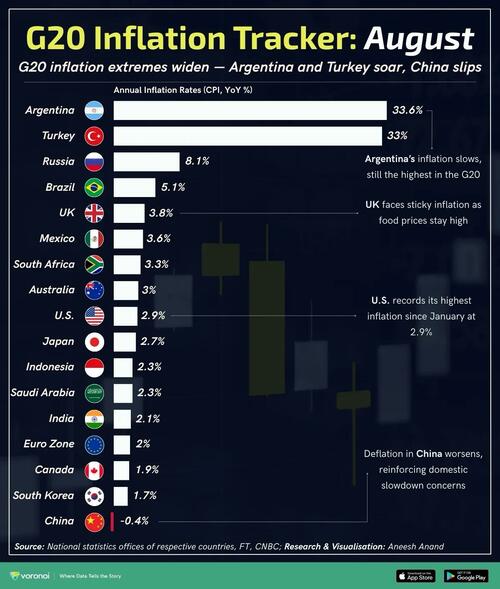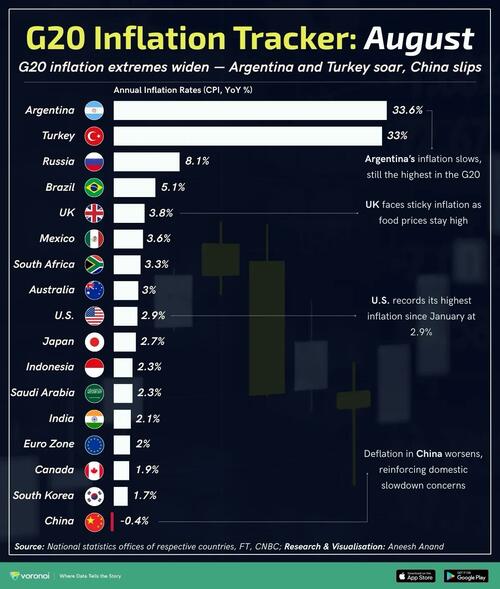Inflation remains one of the most pressing global economic issues, and this monthly G20 inflation tracker, via Visual Capitalist's Aneesh Anand, highlights the wide disparities in price growth across the world’s largest economies.
Data comes from the national statistics offices of G20 countries. This August 2025 snapshot captures a continued divergence, with some countries still facing surging consumer prices while others battle deflation.
Here’s the full data set comparing annual inflation rates (CPI, YoY %) in each G20 nation:
At a glance, Argentina (33.6%) and Türkiye (33%) remain the top two inflation hotspots, while China is the only G20 member in deflationary territory at -0.4%.
Argentina: High Inflation Persists, But Shows Signs of Easing
Despite topping the G20 list, Argentina’s inflation trajectory may be turning a corner. Monthly inflation in August came in flat at 1.9%, a notable slowdown compared to earlier in the year. This is the lowest monthly increase since 2022.
However, years of economic mismanagement, currency controls, and a weakening peso have left a lasting impact. Recent U.S. financial support could stabilize Argentina’s economy temporarily—but may introduce new structural challenges if reforms don’t follow.
Türkiye: Interest Rate Policy and Lira Depreciation Fuel Price Growth
Türkiye continues to experience elevated inflation at 33%, with food, energy, and housing costs soaring. The central bank’s decision to cut interest rates despite ongoing inflation has drawn criticism. Consumer prices rose more than expected in August, testing the credibility of monetary policy.
The weak Turkish lira has further exacerbated inflation by raising the cost of imports. Without a decisive shift in economic policy, inflationary pressures are likely to persist.
China’s Slide into Deflation Signals Deeper Economic Concerns
While many nations are still battling inflation, China stands out for the opposite reason: deflation. Consumer prices declined by 0.4% year-over-year in August, suggesting weakening domestic demand.
This trend is part of broader economic issues facing China, including a shrinking working-age population, falling birth rates, and a rapidly aging society. These demographic shifts are expected to reduce productivity and consumer spending over the long term. Meanwhile, the country’s once-booming real estate sector, estimated to account for up to 30% of GDP, continues to face a protracted slowdown, with falling home prices and developer defaults contributing to weak investor and household confidence.
China’s deflation may be symptomatic of deeper structural changes. These include an overreliance on investment-led growth, rising local government debt, and the challenges of transitioning to a more consumption-driven economy. Without robust domestic demand or significant policy shifts, deflationary pressures could linger, posing risks to both China’s long-term growth and global trade dynamics.
Global Inflation Outlook Remains Uneven
Inflation in the U.S. reached 2.9% (its highest since January), while countries like Japan (2.7%) and the Euro Zone (2.0%) hovered near central bank targets. Canada (1.9%) and South Korea (1.7%) remain among the lowest.
For a longer-term perspective, explore our previous coverage on global inflation projections through 2026.
Loading recommendations...

